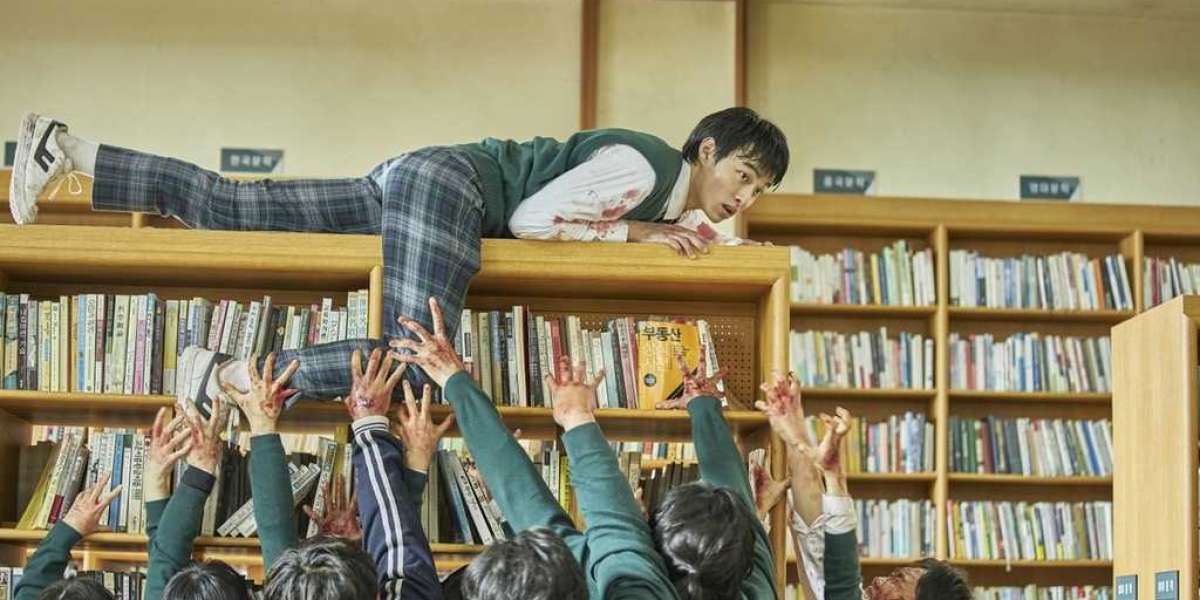Korean films and TV dramas have been a great source of learning how native Koreans talk for Pramesti, a 23-year-old Indonesian. Then she saw the Netflix blockbuster "All of Us Are Dead," which made her doubt her understanding of some Korean swear words.
"The principal characters used a lot of Korean swear words, especially 'ssibal.'... "A lot of people said 'saekki,' which I know is an insult, but it didn't feel like a curse because it was uttered between close friends," she added. She stated that she was perplexed and Googled such terms.
After seeing the zombie horror series, it appears that many viewers, including Pramesti, couldn't get the harsh comments out of their thoughts.
"I like to watch Korean adolescent films and dramas." "I believe 'All of Us Are Dead' utilized more swear words than any other drama," said Iya, a Korean drama enthusiast in her twenties who lives in the Philippines.
"All of Us Are Dead," based on a famous webcomic, follows a group of high school kids who find themselves imprisoned at a school where a zombie virus has taken hold. Since its premiere on Jan. 28, the 12-episode drama has led Netflix's weekly official list for non-English TV series, with more than 361 million hours seen as of Wednesday, according to the streaming site.
There have been an increasing amount of messages on Twitter concerning Korean slang terminology used in the coming-of-age drama as its popularity grows at home and overseas.
"Just watched 2 episodes of 'All of Us Are Dead' and all I heard was 'ssibal,'" one tweet from Jan. 31 says. "The program is roughly 20% zombies and 80%'ssibal,'" according to a tweet from a different source on Feb. 1.
More than 120 swear words may be heard in the first three episodes, in which a mystery sickness spreads and turns affected individuals into zombie-like animals.
Various curses and slang expressions are exchanged between young characters in the drama, including "byeong-shin," "gae saekki," "jiral," "jonna," and "nyeon," in addition to "ssibal," a nasty word used when something goes wrong or to criticize someone. Depending on the circumstances, these terms can be interpreted as stupid, bastard, bullshit, or bitch.
Is it a case of exaggeration or reality?
Even native Korean speakers are split on the show's usage, or misuse, of slang phrases. While some claim there are exaggerations, others believe the drama truly captures the vocabulary of Korean teenagers.
"In episode three, despite the fact that their homeroom instructor was there in front of them, students yelled at each other and exchanged hate words. "While students nowadays use a lot of slang phrases, they prefer to check their language in front of instructors or parents," Park Sang-wok, a second-year student at Anyang Arts High School, explained.
Yoo jin-Seok, a high school student, stated he didn't see anything unusual. According to an 18-year-old Suwon resident, curse words are now a part of school life.
"Whenever my friends and I chat about each other's issues or even good news, we use 'ssibal' practically every half hour."
He said that, depending on the speaker's tone, the curse word may also be used as a favorable reaction to anything.
"Of course, using swear words at school is wrong," he stated, "but some, particularly 'ssibal,' have become a frequent expression of delight, despair, or surprise among youths."
Yoo further stated that phrases like "byeong-shin" and "saekki" are frequently used informally among close friends.
Yoo's remark is backed up by a 2020 poll.
Nearly 67 percent of the 3,429 young pupils aged 9 to 18 who were questioned by the National Institute of Korean Language in 2020 stated they used swear words in regular discussion with peers. While 36.1 percent of respondents believe using curse language is inappropriate, another 28% believe it is acceptable in some circumstances.
Local content artists must strike a balance between accurate portrayals of life and correct language use, according to cultural experts.
"Viewers would perceive a vast gap between the shows and their life if characters in TV shows and films exclusively used polite language." According to cultural analyst Jeong Deok-Hyun, "a truthful picture of the times is crucial, which is what many people want from the cinema and entertainment sector."
"However, producers should avoid overusing slang phrases since it might harm the language habits of young students, who are more strongly exposed to the media than ever before thanks to the fast expansion of social networking platforms."
Is this a documentary on Korean school life?
Another feature of the zombie-apocalypse series that has captivated viewers is its depiction of Korean school life and student interactions.
Chris, a 29-year-old Dutchman, was enthralled by the scene in which On-jo, one of the main female characters, confessed her love for her infatuation with Soo-hyeok by giving her name tag to him.
"I was raised in a place where school uniforms are not required. "It was extremely charming and brilliant to ask someone out by handing them a name tag," said the YouTuber, who has published response videos to all of the episodes on his channel Boke React.
The question of whether or not Korean teens distribute their name tags as a loving gesture has sparked heated debate in internet forums.
The actress who portrayed On-jo, 18-year-old Park Ji-hoo, noted in a behind-the-scenes commentary that swapping name tags is "not a popular technique of professing love among Korean high school students."
Some believe that when the original webtoon was produced in the 2000s, it was one of the most popular ways of professing love.
"Students were given extra name tags in case they misplaced theirs. Many couples, I recall, had each other's additional badge pinned to the right side of their blazers. "Some people put photos of them on Cyworld," Jin Jong-hwan, a 29-year-old female office worker in Seoul, recalls. Before Facebook and Twitter, Cyworld was Korea's most popular microblogging network.
Another overseas watcher from the United Arab Emirates thought it was intriguing that the drama's pupils are the ones who maintain their classrooms tidy.
"It was fascinating to see the characters take responsibility for the cleanliness of their school." In my nation, students do not tidy their classrooms. "I believe it's a fantastic concept that kids clean their own classroom," Roza, who is 23 years old, remarked.
"Another thing I found fascinating is that the characters remove their shoes at school and replace them with slippers."
Lani, a 25-year-old Berlin college student, was taken aback by the representation of animosity against poor peers.
Na-Yeon refers to her classmate Kyung-soo, who lives in a government-provided public housing unit for low-income families, as "gisaengsu" in the third episode of the program. It's the abbreviated form of a term that refers to someone who receives minimal livelihood assistance. It is used to degrade welfare beneficiaries because its sound is close to the Korean term for "parasite" (gisaengchung).
"I read various news articles after viewing the film about how some Koreans, particularly those who live in affluent districts, discriminate against tenants of public housing complexes. I saw a photo of public flats with different colors than private apartments. "I was startled that Korean teens coined new terminology to disparage the poor, but on the other side, Na-yeon's hate speech illustrates a global problem of economic division," the spectator added.


